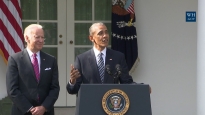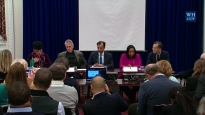Weekly Address: Making Higher Education More Affordable for the Middle Class
August 24, 2013 | Public Domain
In his weekly address, President Obama notes that while college education has never been more important, it has also never been more expensive, which is why he proposed major new reforms this week to make college more affordable for middle class families and those fighting to get into the middle class.
WEEKLY ADDRESS: Making Higher Education More Affordable for the Middle Class
WASHINGTON, DC— In his weekly address, President Obama noted that while college education has never been more important, it has also never been more expensive. That’s why the President proposed major new reforms to make college more affordable for middle class families and those fighting to get into the middle class. The President’s bold plan would tie federal financial aid to the value and opportunity that colleges provide students, encourage innovation and competition, and help Americans manage their existing student debt by allowing everyone to cap monthly payments at 10 percent of their discretionary income. The President acknowledged that these reforms won’t be popular with everyone – especially those who benefit from the status quo – but we have to shake up the current system because the path we’re on is simply unsustainable.
The audio of the address and video of the address will be available online at www.whitehouse.gov at 6:00 a.m. ET, August 24, 2013.
Remarks of President Barack Obama
Weekly Address
The White House
August 24, 2013
Hi, everybody. Over the past month, I’ve been visiting towns across America, talking about what our country needs to do to secure a better bargain for the middle class.
This week, I met with high school and college students in New York and Pennsylvania to discuss the surest path to the middle class – some form of higher education.
But at a moment when a higher education has never been more important, it’s also never been more expensive. That’s why, over the past four years, we’ve helped make college more affordable for millions of students and families with grants and loans that go farther from before.
But students and families and taxpayers cannot just keep subsidizing college costs that keep going up and up. Not when the average student now graduates more than $26,000 in debt.
We cannot price the middle class out of a college education. That’s why I proposed major new reforms to make college more affordable and make it easier for folks to pay for their education.
First, we’re going to start rating colleges based on opportunity – are they helping students from all kinds of backgrounds succeed, and on outcomes – their value to students and parents. In time, we’ll use those ratings to make sure that the colleges that keep their tuition down are the ones that will see their taxpayer funding go up.
Second, we’re going to jumpstart competition between colleges over innovations that help more students graduate in less time, at less cost, while maintaining quality. A number of schools are already testing new approaches, like putting more courses online or basing course credit on competence, not just hours spent in the classroom.
And third, we’re going to help more students responsibly manage their debt, by making more of them eligible for a loan repayment program called Pay-As-You-Earn, which caps your loan payments at 10 percent of what you make. And we’ll reach out directly to students to make sure they know that this program exists.
These reforms won’t be popular with everybody. But the path we’re on now is unsustainable for our students and our economy.
Higher education shouldn’t be a luxury, or a roll of the dice; it’s an economic imperative that every family in America should be able to afford.
Thanks, and have a great weekend.
|
November 9, 2016
|
November 7, 2016
|
November 5, 2016
|
October 31, 2016
|
|
October 31, 2016
|
October 31, 2016
|
October 29, 2016
|
October 29, 2016
|
- &lsaquo previous
- …
- 10
- 11
- 12
- 13
- 14
- 15
- 16
- 17
- 18
- …
- next &rsaquo







